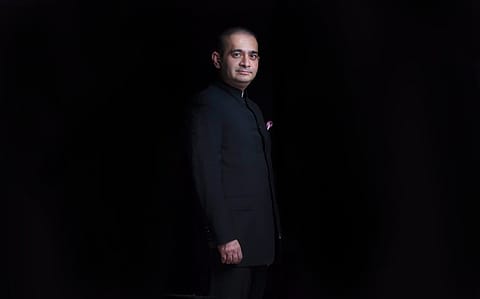U.K. signs off on Nirav Modi’s extradition
The jailed diamantaire can still appeal against the United Kingdom's home ministry's nod, but the prospect of him returning to India draws near.

Two years after he was arrested, jailed diamantaire Nirav Modi who has been held in custody in Wandsworth Prison in the U.K., has been indicted on the charges that were levelled against him by government agencies that have been leading the investigations around allegations of billions in bank fraud by the jeweller. The U.K.’s home secretary, Priti Patel, has given the nod for his extradition.
Nirav Modi has appealed more than half a dozen times, but been rejected by the courts in England. He still has two more appeals that he can exercise in the legal system in England as well as a potential plea seeking asylum before he is finally deported to India, say lawyers who understand the British legal system and are following the case.
The charges against Nirav Modi range from colluding with bank officials to siphon funds from Punjab National Bank (PNB), threatening witnesses, to laundering of money and more.
Vivek Kapoor, barrister with 39 Essex Chambers in London, says that the U.K. is very clear it doesn't want to be a haven for economic offenders. “The government in England is conscious that it has to alter that image and so while Nirav Modi has avenues for recourse, one shouldn’t expect any clemency for cases such as these,” he said. “The second is that the courts will not encourage any frivolous efforts to delay due process. They will not allow their judicial process to delay and evade arrest in the countries that they have run away from.”
Europe has by and large taken a view of disallowed extradition on the human rights and inhuman jail conditions factors, Kapoor says, but when it comes to English courts, the view is to be pragmatic and require evidence of so-called political persecution.
Raian Karanjawala, managing partner of top litigation law firm Karanjawala & Co., based in New Delhi, says that if one sees the process of the history of extradition over the last 25 years then it can be split into two parts: before Prime Minister Narendra Modi and after. Initially they never met with much success because the government never really prioritised it and their pursuit was often lackadaisical. Alleged underworld figure, the late Iqbal Mirchi, and Nadeem Saifi, who is wanted in the shooting of T-Series promoter Gulshan Kumar, were not extradited from the U.K.
The Modi government chose to follow a policy that if it went after someone, then it would throw all its resources behind that effort and the net result is the rapid progress behind both the Vijay Mallya and the Nirav Modi cases, says Karanjawala.
Recommended Stories
Nirav Modi’s defence on grounds of mental health is not seen as a reason to dismiss extradition. According to the judgment issued by the court several weeks ago, he has a family history of suicide, and he had also reported both suicidal intentions and ideas but the doctor who examined him confirmed that the suicidal intentions are not immediate in nature and that “[Nirav] Modi's mental condition is not such that it removes his capacity to resist the impulse to commit suicide.” Nirav Modi technically can still apply on those grounds but his case satisfies the principle of dual criminality, says one legal expert. “Cheating, and money laundering, and bribery,” he said.
It remains to be seen what legal course of action courts and authorities across the world will pursue across Nirav Modi’s other co-conspirators, which include his brothers Neeshal and Nehal Modi, his sister Purvi Mehta, employees at PNB, and senior C-suite execs who worked with Nirav Modi and include Hemant Bhatt and Mihir Bhansali.
In addition, Nirav Modi’s uncle Mehul Choksi, whom the diamantaire referred to as his mentor, remains at large, and is believed to be in residence in Antigua.
Not long ago, finance minister Nirmala Sitharaman had publicly announced that wanted businessmen Vijay Mallya, Nirav Modi, and Mehul Choksi would all soon be returning to face the law.
(INR CR)
One lawyer familiar with the case says Nirav Modi has 30-60 days to file the case but his legal team may play for time and it could take as long as three to six months more before a final adjudication is passed; however, there is a sense that the governments have fast-tracked this matter.
“India’s voice on the global stage has been getting heard more by other nations and in a post-pandemic, post-Brexit world where economies are likely to transform, England is clear about its stance,” Kapoor said. “Even if there is an appeal and leave given to [Nirav] Modi, one can expect that the matter will be dealt with very swiftly.”